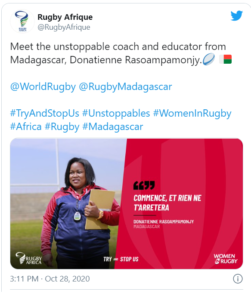
Since Donatienne Rasoampamonjy discovered rugby as a teenager, the game has changed her life. Now she helps other players discover the sport in turn.
Donatienne Rasoampamonjy sits for a moment against the wall of the shady changing room while the summer sun beats down in her far flung corner of Madagascar. Time for a break, but only a brief one.
It’s been three years since the 29-year-old opened a rugby school in 2017 in Ambositra, her native village, in the island’s central Amoron’i Mania region, and the club now welcomes around 30 players.
“We have a few girls, especially in U16, but they train with the boys,” she told World Rugby in an interview between two training sessions.
Rasoampamonjy herself did not have the chance to start rugby so early. She only discovered the sport at 18 when her sports teacher mentioned it in a class.
“Since my childhood, I was very tall, I was always taller than girls my age,” she says. For three years, she focused on basketball, football and rugby before stopping the first two.
“I actually felt more comfortable with rugby, it’s the sport that suited me the best. The values also corresponded to me better: solidarity, integrity… Rugby educated me more than other sports,” she explains.
LIFE LESSONS
Though Rasoampamonjy started out playing sevens as a teenager, she quickly turned towards 15s as a prop – in fact her first tournament fell on her birthday and had a profound impact on her… “I found there a real spirit of sharing between us all, it was admirable,” she recalls.
Her transition to university was not the easiest, however. Coming from a modest background, she ran into financial problems. But ‘Do’ is not the type to give up and she says she drew the strength to hold on and move forward in her management studies course from rugby.
“When you play rugby, you face problems, but every time you have to find solutions, you seek the support of your team-mate, you fall, you get up. In life it’s exactly the same. If I had not played rugby, I would not have been able to finish my studies,” says Rasoampamonjy.
A national coach noticed her and convinced her to do a coaching internship. She quickly climbed the ranks, passed her level one and two certificates, and was fully involved in the World Rugby Get Into Rugby programme along with other educational programmes.
“I think it’s important to know the rules, but also first aid when a player is injured,” she says.
TEACHING THE PRACTICE AND VALUES OF RUGBY
Despite rugby’s enormous popularity on the island, few girls play the sport in Amoron’i Mania. In fact, few boys were involved either when she returned home from her studies. But Rasoampamonjy was fortunate enough to be hired at a high school as a sports teacher, where she was quickly able to start teaching rugby.
“It was quite difficult at the beginning,” she admits. “Often people think it’s dangerous for girls. So, to show them that this was not the case, we organised a lot of festivals, we did a lot of showcases just to show that we could play everywhere. In addition to practice, I teach the values, rights and duties of the player, the responsibility to protect oneself, to protect your team-mate but also your opponent. This is how we found success.”
That success is easily measured. “In 2017, we participated in the national school championship and we were champions of southern Madagascar and placed third in the finals. In 2018, it was the same result and we also reached third place in the Madagascar U18 men’s championship that we won the following year,” she explains.

Given the remarkable path she has blazed, it’s no surprise that Rasoampamonjy has been named one of Rugby Africa’s Unstoppables. World Rugby’s ‘Try and Stop Us’ campaign aims to highlight the women the world over who have distinguished themselves by their fierce desire to grow the sport. And through her dedication, Rasoampamonjy has certainly done that.
“I pay my expenses, my catering, my accommodation each time there is a training course somewhere,” she explains of her unrelenting schedule – and drive.
“Often I have to travel for eight hours to participate. I leave on Friday evening in a bush taxi to start the training at 8am and on Sunday evening I leave at 8pm and arrive home at 4am to start again at school at 8am,” she explains.
Since neither distance nor fatigue can stop her, it was hardly surprising she would prove to be the Fédération Malagasy de Rugby’s choice to highlight the Unstoppables campaign. “Female practice interests me a lot and I feel that I have things to contribute,” she says.
Through her commitment, she hopes that women’s rugby will develop in the 22 regions of Madagascar so that a national championship can be created. “You can do anything if there is passion,” she insists.

